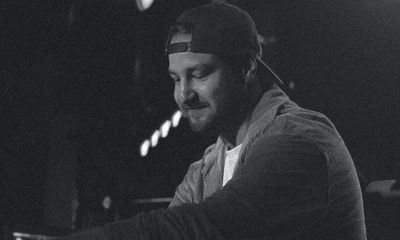dig dis!cover: Martin Kratzenstein
You are not only a label manager, but also a musician and producer. What does a typical day at work look like for you?
That's super varied. At the moment there is not a lot happening. It's summer vacation and I'm currently taking care of our labeltasks for 2-3 hours a day. There were other times when I really worked every day, including Saturdays and Sundays for 16 hours a day and that for years in a row. As I said before, things are less busy and we don't take new artists on our label at the moment. The whole business has gotten much easier with less work.
You've been in the music business for decades now. What was the main point for you that made you decide to completely dedicate yourself to music?
I used to have six restaurants or bistros, which actually all ran quite well until 2002, when the euro was introduced and everything went down abruptly. I had to file for insolvency in 2003, one year later. Before I started with gastronomy, I studied music and during this time I made and produced music quite successfully under different projects. And that's when I decided to just do music - I couldn't do anything else except restaurants and music. I was lucky enough to have my first single go straight to number 1 on the club & dance charts and from then on it went pretty well. In the following years my music became bigger and bigger and also more successful.
Did you have live music in your restaurants back then, too?
Yes, I also had live music in my restaurants. There were various people playing - mostly jazz, but also rock sometimes.
Vocals and real instruments play a big role in the sound of your labels. How do you find the singers (or do they find you) and how does the collaboration work?
My work process doesn't differ that much from conventional DJs. I pre-produce all the music on the computer. Usually I already have in mind which person will do the vocals. Meanwhile, I have a larger selection of singers and during the production I already picture which voice is suitable for the track. When I question the singer, I usually get positive feedback - of course it can happen that it doesn't work out, but then I choose someone else.
Finally, I also add live instruments. I usually play the piano/keys and basses myself and sometimes I play the percussion.. If it should be a more complicated guitar riff, then of course I get myself a guitarist. The whole thing is pre-produced with Cubase and sometimes it's so good that I leave it like that. If I decide it should go into the jazz direction though, then I have it recorded live of course as the Genre clearly lives from natural and warm sounding live recordings.
The search for my singers started with Brenda Boykin. I went to a concert of her in Wuppertal and I knew right away that I would like to have her on my tracks - but I almost didn't dare to ask her, because I was really at the beginning of my music career. At that time I had just released two instrumental albums and had nothing to show except my number 1 hit. I struggled with myself for two days until I called and asked her. Her answer was: "Yeah, sure, I'll do it!" That was totally awesome and a few days later we recorded the track together and she sang through the song in one take. I didn't need a second take, as she was that good! The whole thing was done in 5 minutes.

How did it go on with your music?
I recorded a few more tracks with her and completed the album. That was also my first album with vocals. With that I became more known and my music was featured on a lot of compilations. When my music appeared on Hôtel Costes and Café del Mar., it was quite easy to find singers to collaborate with me.
How has the music industry changed for you? How do you feel about the transition from selling physical music to streaming / downloading music?
Like many musicians, I like to hold a physical CD in my hand. But downloading and streaming music is still super convenient. We don't have to make payments in advance and we don't have to press CDs. On the other hand, you can no longer determine the prices yourself. I wish I could determine the sales of streams myself instead of accepting the default prices of Spotify or Apple Music. But income-wise and risk-wise, I'm much better at streaming than selling CDs. What's also nice is that you don't have to deal with returns anymore and basically the work has become easier.
How has the music world changed for you and your label in the last 2 years in relation to the Corona Pandemic?
During the Corona crisis there were several requests that the radio stations should please play more tracks from German artists, because all live revenues were lost. I looked at my GEMA statement from last year and I only received half as much as the whole 8 years before. Accordingly, the radio stations have not only ignored this request, but have probably then played no more German artists at all.
Unfortunately, the streams also became less, at least during the lockdown. I could see it quite well on my label: about 40% the music was streamed less, for the simple reason that also the stores were closed and music was often heard in bars, restaurants and pubs. I was also worried at the time, because we didn't have any live gigs anymore, streams were dropping rapidly and CDs weren't being sold either. So the Corona Pandemic had a big impact on my label. Thank god, it looks like it has normalized again from this summer onwards.
You are in our distribution with the label Glamjazz Records (Audiographics) and ChinChin Records. Which audience are you aiming for with your music?
In Spotify Analytic I can see that the peak of listeners are between 45-59 years old. This is also the experience we have from our live concerts. I would also tend to say that the average age of listeners is around 60. Sure we have younger listeners too, but on average they are a bit older.
Then one last question for today: Is there something in the music business that bothers you or that you like in particular?
When I'm on social media, it happens very often that everyone rants about GEMA and the streaming platforms. Sure, there's room for improvement here and there, but basically GEMA (and Spotify for example), make life easier for musicians. What I can't understand is when an artist complains about not having 1000 streams after two years and then blames Spotify for it.
And that's exactly what makes the music world so special. You never know how your tracks will be received by the community. It happens regularly that an artist releases something on our site that I personally think is great, but in the end only a few people are interested in it. And it's also a phenomenon that we can't control or influence. Sometimes I think it's a pity that the artists blame it on the label manager or the stores themselves. However, the cooperation works well and as a musician I am grateful that music distributors, GEMA and music stores make the business with music easier.
A big thank you goes to Martin, who took the time to talk to us about his career as a musician despite his vacation. If you are also interested in sharing your story about your daily music business life, please contact us anytime.



